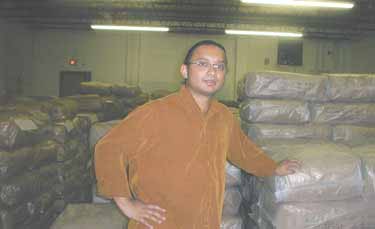
There are few places that are as desolate and beautiful as a tea garden in the heart of Upper Assam. Hundreds of thousands of tea bushes on every side and the nearest town fifteen kilometers away, yet even a city boy growing up in these surroundings didn’t have much time to miss his city. His most favorite pastimes were fishing with his boroxi or jakoi, or heading out into the Buri- Dihing jungles on foot, with his dah and his twenty-two bore Bruno rifle.
His father owns two tea gardens, Satrupa (aka Konapothar) Tea Estate in Tinsukia district, and Rani Tea Estate in Kamrup district. He has a knack for working on details, maybe, because of his training as a mechanical engineer, and today his Assamese teas are considered to be amongst the best (if not the best) of teas being harvested in Assam. His farming interest also extends into fisheries, goat farming, and a diary farm. He has the distinction of owning the only operational hydroelectric power plant in northeast India. His North American subsidiary, Assam Tea Company, was incorporated in 2000 and till date they have been marketing teas through three channels. The bulk of the teas are sold to importers, branders and gift product manufacturers who buy in larger volume (an average of 10,000 pounds per order). The smallest segment, but with the largest potential market, is their online retail store (www.assamtea.biz). Through this e-store they offer the largest selection of single malt (un-blended) specialty Assamese teas to consumers in US & Canada. The last segment of their customers is retailers with one or more retail outlets. These are usually tea bars, teashops, cafés, restaurants and gift shops. They also have quite a few social clubs that are part of this last segment of customers. Most Assamese people don’t know much about the very interesting and complex world of tea that’s the heart of the Assamese economy. They harvest over 200 varieties of black teas every year, making Assamese tea the number one selection worldwide for the highest quality black teas. Commercially, black teas are harvested and processed in two traditional styles in Assam – either leaf teas or granular teas. Their tea gardens (Satrupa and Rani) are 100% leaf tea manufacturers. However, most Assam tea gardens are predominantly granular tea manufacturers. The European, and North American marketplaces prefer leaf style teas.
Even through since the 1850s, Assamese black tea has been the backbone of the British tea industry, one will be surprised to find that very few tea drinkers in the Western world know their Assams from their Earl Grays. Also the fact that there are very cheap black teas available from a number of other countries worldwide, many tea importers blend (mix) a tiny bit of Assamese teas with teas from Sri Lanka, Vietnam, Kenya, Argentina or China, and call them Scottish Breakfast, Irish Breakfast, etc. Most of the Assamese teas in North America average about three to four years of age.
The biggest challenge of selling pure quality Assamese teas in North America is ignorance. As people concerned educate North American tea buyers and marketers on the profile and taste characters of Assamese teas, they start seeing the light behind how they can make a bundle by marketing specialty Assamese teas in the fastest growing tea market in the world (i.e., North America). They start figuring out how to get rid of their stash of decade old Assam blends, and replacing them with a wide range of incredible tasting single malt Assamese teas. Finally, American consumers are starting to get the choice of whether to drink thick, malty, autumnal harvest, single malt from Satrupa or a thin, tart, complex body, wet-ending Lower Assam tea, from Rani Tea Estate. I had the opportunity to taste myself during my visit to this establishment at St. Petersburg in Florida.
Saunam Bhattacharjee is doing a tremendous job in marketing Assamese tea bringing directly from the tea gardens in Assam to the cups in North America. The photo shows him in his warehouse where he is expecting another container.
- Ganesh Bora, Lake Alfred, Florida
- Log in to post comments